Gelding Graymalkin
I am a single woman with two cats.
Actually, three cats.
With that admission, I sense a rustle of discomfort rise:
A single, older, woman who lives with two cats, much less three, is probably needy, emotionally damaged, best to be avoided.
Also, her house is sure to smell of cat pee.
That this supposed emotional neediness appears to be fulfilled by animals long associated with witches—as witches are assumed to be older, single women—compounds these rumors.  Cats are often depicted as “familiars,” spirits, often in animal form, who serve—especially a witch.
Cats are often depicted as “familiars,” spirits, often in animal form, who serve—especially a witch. 
However, in addition to the abiding affection my two cats, Oona 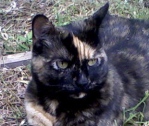 and Lucy, arouse in me, they lower my heart rate, make me
and Lucy, arouse in me, they lower my heart rate, make me
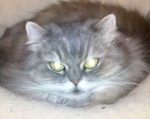 laugh, and offer a sustaining and most comforting weight near my feet when I sleep, as I do these days, alone.
laugh, and offer a sustaining and most comforting weight near my feet when I sleep, as I do these days, alone.
The third cat, grey and feral, wandered on to my scrubby acre in the foothills of the Sierra Nevada about four years ago.
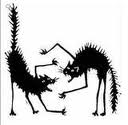 For the first summer he was around, I knew him only as one of a pair of cats that fought hard and loudly, rolling in an almost comical burst of gray limbs across the slope above my house, a yowling mass of feline that would then separate and run in opposite directions.
For the first summer he was around, I knew him only as one of a pair of cats that fought hard and loudly, rolling in an almost comical burst of gray limbs across the slope above my house, a yowling mass of feline that would then separate and run in opposite directions.
In between these bouts, one or both of them would come scouting about the house. Both had gray bodies and startling eyes, the color of liquid forsythia.
They could have come from the same litter, brothers now fighting over ownership of a parcel each considered his own.
But one of them was nasty. That’s how I differentiated them: the mean one and the other one. The mean one was viciously scarred, and the time came when one of those fights must have killed him—or the coyotes got him, or a bobcat. 
He disappeared. Now there was just one gray cat skulking through the cat door (open all day, closed at night) to scarf food out of Lucy and Oona’s bowls. He’d come by not even weekly, causing me to muse on the territory of cats.
The cougar who took my cat Chaco, at dusk a few years ago, had a territory: The same large cat had been seen in vicinities miles and miles apart. So it was easy to imagine  that the gray shadow occasionally found in my house, quick to bolt if surprised at kibble-stealing, might also have a territory he considered his own, which included other houses in my forested neighborhood. I imagined he might be fed elsewhere as well, tolerated or chased off, as the case may be. He might be known to these households as Shadow. Smoke. Spook. That damn stray.
that the gray shadow occasionally found in my house, quick to bolt if surprised at kibble-stealing, might also have a territory he considered his own, which included other houses in my forested neighborhood. I imagined he might be fed elsewhere as well, tolerated or chased off, as the case may be. He might be known to these households as Shadow. Smoke. Spook. That damn stray.
The Shakespearian in me and perhaps the witch as found herself thinking of Macbeth, Act I, Scene I, which in Freshman English, Wells Kerr made everyone memorize, thus infusing me with a love of the bard forever. In front of the class, Sarah Wilson, Sarah Swinerton, and I stirred an imaginary pot and called to our familiars:
When shall we three meet again?
In thunder, lightning, or in rain.
When the hurly-burly’s done.
When the battle’s lost and won.
That will be ‘ere the set of sun.
Where the place?
Upon the heath.
There to meet with Macbeth.
Come Graymalkin,
Paddock calls.
Anon.
Fair is foul and foul is fair…
Naming the cat after a witch’s familiar was a joke between me, myself, and I, but perhaps because he now had a name, Graymalkin began to be around a lot more. 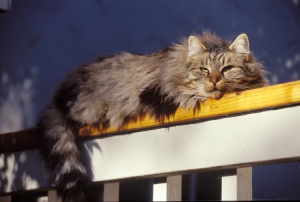 He lolled on the deck in the sun at a distance from Oona and Lucy (both spayed females), who tolerated him. There was no moaning or hissing; in fact, they seemed to rather like his company, his slitted yellow eyes, his scruffy presence, a tough kid tolerated for the sheen he gave their own lovelinesses.
He lolled on the deck in the sun at a distance from Oona and Lucy (both spayed females), who tolerated him. There was no moaning or hissing; in fact, they seemed to rather like his company, his slitted yellow eyes, his scruffy presence, a tough kid tolerated for the sheen he gave their own lovelinesses.
Over the next three years I was often away on various jobs, or traveling, and through them all, according to my housesitters, Graymalkin was a presence. He tended to stick around in winter months, when as soon as I’d open the cat door, his rusty meow would announce he’d been sleeping amidst the boxes on a garage shelf,  close enough to hear the rasp of the little tin door sliding out of its frame, and that he was ready for the food that he had by now come to expect (although having his own supply of kibble and water did not keep him from scavenging out of the girls’ bowls.) I thought often of simply incorporating him into the household. But he was having none of it. Once the weather warmed and the trees began to swell with that not yet visible green, the sap moved in his limbs as well, and he was off—I wouldn’t see him for weeks at a time. When I did he’d be sleeping a sleep that literally looked dead, often with a chewed, scabby ear, a wound on his neck, a paw covered in blood.
close enough to hear the rasp of the little tin door sliding out of its frame, and that he was ready for the food that he had by now come to expect (although having his own supply of kibble and water did not keep him from scavenging out of the girls’ bowls.) I thought often of simply incorporating him into the household. But he was having none of it. Once the weather warmed and the trees began to swell with that not yet visible green, the sap moved in his limbs as well, and he was off—I wouldn’t see him for weeks at a time. When I did he’d be sleeping a sleep that literally looked dead, often with a chewed, scabby ear, a wound on his neck, a paw covered in blood.
It was fretting about one of these wounds that led me to first touch him. I did not move quickly. Holding a warm washcloth I touched the cut on his neck. To my surprise he stayed utterly calm. I wondered it he might be purring. I began to sit close to him on the deck, when he’d be there lounging, and one day he lofted himself up from where he’d been dozing, stepped across the few feet of bench that separated us, rolled his hip up against mine, and with a little heave of his lungs, went back to sleep. One day I just scooped him up. He pressed his head into my underarm and left it there for about thirty seconds; his body, for that time, utterly limp with what felt to me like relief.
He’d been loved once, it became clear. He never once scratched me, not even if a loud noise startled him while  I was holding him. He’d jump, but without leaving scratch marks behind. When he was with me, his claws were always retracted, although his occasional wounds (which he always allowed me to clean) demonstrated that he knew how to use them. He’d had a decent upbringing, one way or the other. I wanted to believe that, like my dear Miwok, he’d been frightened by a thunderstorm and run off and become lost, rather than (as in fact I believed), being released into the nearby woods because his owners were leaving town. I cringed when I imagined this scenario. Once we take on the care of an animal, even if it adopts us, it’s our responsibility to care for it, or to find care for it, throughout its life.
I was holding him. He’d jump, but without leaving scratch marks behind. When he was with me, his claws were always retracted, although his occasional wounds (which he always allowed me to clean) demonstrated that he knew how to use them. He’d had a decent upbringing, one way or the other. I wanted to believe that, like my dear Miwok, he’d been frightened by a thunderstorm and run off and become lost, rather than (as in fact I believed), being released into the nearby woods because his owners were leaving town. I cringed when I imagined this scenario. Once we take on the care of an animal, even if it adopts us, it’s our responsibility to care for it, or to find care for it, throughout its life.
This awareness was part of a guilt that began to build around Graymalkin and his, shall we put it, unaltered state.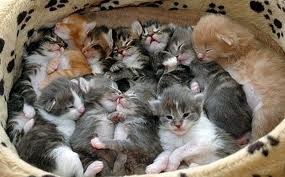
###
By this time he’d commandeered the top of some shelves located outside the dining room window, where I keep pots and planting paraphernalia. Morning sun hits this spot, and as it’s also under the eaves, it provides shelter from all but the most beating of rains, and from the snow. I made him a nest there, where he was already sleeping: at first a box of old towels, eventually a washable bed purchased at K-Mart stuffed in a plastic bin. 
Sometimes, in those stretches of weeks he’d be absent I’d wonder if he was gone for good this time, and came to recognize a little leap in my heart when I’d see him sleeping in that basket outside the window, or hear the rusty meow outside the cat door. I tamped it down. He was a stray. He liked to roam. I would not allow myself to love him.
Yet I worried about the bad citizen I was being. In addition to testosterone-fueled fights, how many litters was Graymalkin spawning when he wandered off on his spring and summer rounds?  I’ve rescued almost all my cats from the pound, including Oona as a kitten, and I could all too easily imagine the population I was helping to create.
I’ve rescued almost all my cats from the pound, including Oona as a kitten, and I could all too easily imagine the population I was helping to create. 
But I had a hard time not so much with the idea of getting Graymalkin into a travel cage, but with the drive. The operation would be the least of it, as he’d be, I knew, sedated, but the idea of the panic he’d feel leading up to it, and the upset cat-spray that would get all over my car, made me hesitant. I did go so far as to put a $50 deposit on a cage at a local animal rescue center, but it was one of the times Graymalkin disappeared.
 So I postponed and postponed. Felt guilty about it in the spring, had the guilt assuaged through the winter months when he’d stick close, then guilt again when he’d disappear in April or May and for most of the summer. September he’d again start to be at the door in the mornings with his rusted-hinge of a voice, content to be picked up and held (the head pressed into an armpit, the moment of limp pleasure), before the demand for food was recalled and he’d be out of my arms, standing on hind legs, batting at the bowls I’d lift to wash and refill with water and kibble.
So I postponed and postponed. Felt guilty about it in the spring, had the guilt assuaged through the winter months when he’d stick close, then guilt again when he’d disappear in April or May and for most of the summer. September he’d again start to be at the door in the mornings with his rusted-hinge of a voice, content to be picked up and held (the head pressed into an armpit, the moment of limp pleasure), before the demand for food was recalled and he’d be out of my arms, standing on hind legs, batting at the bowls I’d lift to wash and refill with water and kibble.
###
Last April a group of writers gathered around my table for a workshop, among them  Ariel, a large animal vet, who was crafting her experience into lovely stories about, what else, a large animal vet.
Ariel, a large animal vet, who was crafting her experience into lovely stories about, what else, a large animal vet.
The workshop knew about Graymalkin—in addition to that bed outside the window, they’d seen him come in the cat door and, seeing all those people at the table, promptly duck back out again—and I’d shared my concerns about him. One day, as we finished discussing a manuscript and were about to take a break, I asked Ariel if she worked on small animals too.
“Sure,” she said, knowing what I was asking. “We can geld Graymalkin.”
As one, the men in the workshop crossed their legs.
“Next week,” Ariel pressed, after we stopped laughing. “I’ll bring the truck.”
We knew from her stories what the truck was—a traveling vet clinic, with needles and  scalpels and hoses and ropes and pails, a refrigerator for vaccines, every thing needed to deal with horses, llamas, goats. We agreed I’d call her the following Saturday to let her know that Graymalkin was around.
scalpels and hoses and ropes and pails, a refrigerator for vaccines, every thing needed to deal with horses, llamas, goats. We agreed I’d call her the following Saturday to let her know that Graymalkin was around.
But that night, as if he’d heard us talking, Graymalkin went on Walkabout. I didn’t see him for a month. “Alas,” Ariel, said, “but it’s that time of year. He’ll be back. And he’ll sleep for a week. We’ll try it then.”
However, we couldn’t get his schedule and Ariel’s to mesh. Summer galloped away and in the fall I was out of town on a visiting professorship. My wonderful housesitter took his duties seriously: he got Lucy and Oona in at night and let them out in the morning. Every few weeks he apprised me in writing about their doings, sometimes including details about Graymalkin, to whom he referred as Gray Malcolm, Esquire.
 And then came winter break. My first morning home, I stood by the dining room window,
And then came winter break. My first morning home, I stood by the dining room window, 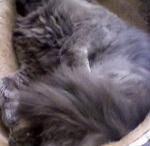 watching Graymalkin in his basket curled tight against the cold, and called Ariel. We made a date for later that week.
watching Graymalkin in his basket curled tight against the cold, and called Ariel. We made a date for later that week.
By the time Ariel’s truck rolled down the driveway, Oona was closed into a back bedroom (I couldn’t find Lucy), and the cat door was locked, with Graymalkin inside, dozing on a chair.
Ariel has capable hands, the nails cut close to the ends of her fingers; her blonde hair usually pulled back in a no-nonsense if mussy ponytail. She is practiced and efficient and superlatively kind—it didn’t take reading her fiction to sense that. She checked on Graymalkin, who stretched and purred a bit before falling back to sleep, and then we walked together back to her truck. She lifted open a few of the doors—they are hinged, like the hoods of old fashioned cars or semis—to reveal shelves on long hearty hinges filled with ordered packets of everything.  And everything in various sizes, I began to realize, as she searched for needles small enough to give Graymalkin the shots he’d need.Also available in various sizes were scalpels, and the one Ariel put on a stainless steel tray (covered by a blue towel), was the size and shape of the
And everything in various sizes, I began to realize, as she searched for needles small enough to give Graymalkin the shots he’d need.Also available in various sizes were scalpels, and the one Ariel put on a stainless steel tray (covered by a blue towel), was the size and shape of the  razors used in box cutters. Coils of nylon thread. Cotton swabs and cotton pads. Tweezers, scissors. Out of the refrigerator came various bottles, into which she plunged needles and drew down and nicked with a practiced flick of a forefinger whatever potions she had in mind.
razors used in box cutters. Coils of nylon thread. Cotton swabs and cotton pads. Tweezers, scissors. Out of the refrigerator came various bottles, into which she plunged needles and drew down and nicked with a practiced flick of a forefinger whatever potions she had in mind.
Too big for the tray, handed to me to carry, were electric clippers, the type used to give a military haircut

In the house I held Graymalkin while she gave him a tranquilizer and an opiate mixed in one shot, which evoked not even a wince or meow. She’d brought a collapsible metal cage, which she constructed quickly, and instructed me—how he trusted me!—to lower him into it. For a bleary moment or two this really bothered him, but then the opiate began to work.
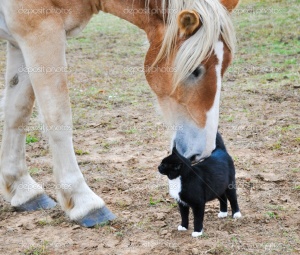
For some operations a horse is given about the same amount of opiate as a cat, a factoid Ariel related to me as we went back to the truck to continue collecting materials. “You wouldn’t want to geld a horse on the same amount,” Ariel said, “but you can do a lot.” She added that to geld a horse, an animal hundreds of times heavier than a cat, you use just four times the amount of opiate she’d injected into Graymalkin.
When we came back into the kitchen, me carrying the tray  (Ariel was very good about giving me jobs so that I might feel useful; much of that afternoon I felt about five years old), Graymalkin was still pawing a bit drunkenly at the bars of the cage.
(Ariel was very good about giving me jobs so that I might feel useful; much of that afternoon I felt about five years old), Graymalkin was still pawing a bit drunkenly at the bars of the cage.
It became clear that the tough shots were up ahead: the anesthetic when injected, I gathered, does something far more than sting. We waited for him to fall completely asleep, then zipped him into a tight blue nylon bag—it reminded me of a heavy-duty stuff sack, within which his tough-boy body looked pathetically small. Ariel made sure one leg stayed free so that she could use that vein. In our haste a bit of his fur got caught in the zipper and that woke him and he began to fight—Ariel had to deal with the jerking leg and claws while also injecting the anesthetic; it made him scream. Suddenly Lucy appeared from the back of the house and leapt up on the dining room table, where we were executing this part of things, and pressed her face very close to his little trussed body, yowling in commiseration, or in concern, or perhaps it was just to tell him to shut up. I shooed her away. Graymalkin went limp, although his heart was pounding so fast I thought it would leap out of his chest.
“OK,” Ariel said, “we’ve got 22 minutes.”
We bundled him over to the kitchen sink, where she unzipped a section of the sack and with the clippers shaved his groin area and a portion of leg. Even with his lower extremities bare he retained his dignity, did Graymalkin. She put him on the plastic tray and put the tray over the sink. She told me to hold him in a particular way—I had no idea if this was really helpful or if it was just to give me a job to do; either way, I did that job really really well. I pressed my cheek to Graymalkin’s chest. His heart fluttered terribly. Will his heart burst? I asked. And Ariel said, He’s a strong boy, a healthy boy, he’ll be fine.
Ariel, like every kind of doctor, said this with utter assurance, even though it felt to me that nobody could survive such a harshly palpitating heart. As she double-checked the implements lined up beside the sink I said something about this being so much work. “Is this what has to happen for every single animal that gets neutered?”
Ariel nodded, and with a little smile looked at me over the tops of her glasses.
“Usually it’s not done over a kitchen sink. Okay. Here goes.”
She took hold of the little scalpel. I closed my eyes and again pressed my cheek against the blue nylon that sheathed Graymalkin’s chest, aware of the sawing motion of the forearm beside me. I heard a wet plop into the metal sink. That’s one, I said to myself, and lifted my head for a moment. But beyond the deft work of that arm beside me, I couldn’t see what she was up to. I placed my forehead against the same beating place, waiting for the second plop, the second of Graymalkin’s jewels, realizing that I had come to love Graymalkin, to love him fiercely.
Ariel reached for an instrument the size and shape of pliers that one might, in fact, use for jewelry making, and grasping Graymalkin’s tubes, tied each one into a knot, knots that would not come undone and, once she let go, would retract far up within him so that he could not reach them, even with a washing tongue.
A last act before we released him from his sack: Ariel took blood samples,  labeling them with Graymalkin and the date, testing for leukemia, rabies, distemper, and Feline HIV. She also gave him shots against these diseases, and as he lay there, pathetic but still breathing, the chest heaving up and down, though not as hard and quick as before, we applied Revolution to the back of his neck (ticks, fleas, heartworm). Then he was put back in the cage to sleep off the remaining minutes.
labeling them with Graymalkin and the date, testing for leukemia, rabies, distemper, and Feline HIV. She also gave him shots against these diseases, and as he lay there, pathetic but still breathing, the chest heaving up and down, though not as hard and quick as before, we applied Revolution to the back of his neck (ticks, fleas, heartworm). Then he was put back in the cage to sleep off the remaining minutes.
As Ariel cleaned up—the efficiency and speed clearly habitual—I just got out of the way. I did peer into the sink. What was mounded there looked almost exactly like the items that come in the paper sack tucked in the body of a Thanksgiving turkey: some red fleshy items— though not the shape of a giblet, nor a liver—and amidst all that red, two hard, paler, round things.
Ariel went outside to wash the implements in a bucket and hot water from her truck’s spigot rather than in my sink. I began to see that ritual, repetition, are an essential aspect of her line of work.  I made us tea in the kitchen that moments before had been a clinic, cut each of us a piece of pie a friend had brought the day before; and as Graymalkin continued to sleep deeply, we talked about her writing, the stories that appeared to be stringing together beautifully into a novel, until he began to stir.
I made us tea in the kitchen that moments before had been a clinic, cut each of us a piece of pie a friend had brought the day before; and as Graymalkin continued to sleep deeply, we talked about her writing, the stories that appeared to be stringing together beautifully into a novel, until he began to stir.
Ariel left about 5:00, taking the cage with her; Graymalkin seemed that recovered. Although drowsy, he lapped at some water—a good sign—before he dozed off again. And for a few hours he did sleep. I lifted him onto his favorite chair under the dining room table, with a towel beneath him in case there was bleeding. There was none.
But by 10:00, Graymalkin was pawing at the cat door, pacing the kitchen, meowing. He ate some food, drank more water, but I was worried: I knew, from a time I’d been gone for two days and accidentally locked him inside the house, that he would not use the cat box. But he would also not relieve himself inside the house—when I’d returned from that trip to find him at the door he’d bolted to a nearby patch of earth to relieve himself. He would soon begin to feel real discomfort, or additional discomfort. I didn’t know what to do. Ariel had said to keep him in for a few days, with the caveat, “He might just really want to go out. And if he does, you have to let him.” So about 3:00 in the morning, I did.
He disappeared like smoke into the night.

 He wasn’t in his basket the next morning, or the next, or the next. I was in a lowgrade free fall of panic. Had I removed his jewels, the source of his fighting and therefore protective nature, and would he now not be able to defend himself, or climb a tree, not be able to survive?
He wasn’t in his basket the next morning, or the next, or the next. I was in a lowgrade free fall of panic. Had I removed his jewels, the source of his fighting and therefore protective nature, and would he now not be able to defend himself, or climb a tree, not be able to survive?
###
Ariel phoned about the blood samples she’d taken, shouting to be heard over the engine of her truck from which she was calling. “It’s negative/negative! Our boy is healthy!”
Our boy was also still gone. But at least he didn’t have rabies, or leukemia, or Feline HIV.
And she called him our boy.
Ariel’s a woman in her fifties with a husband, a daughter, several animals, including a couple of cats. She is not suspect of being emotionally needy; her love is vast, kind, and unsentimental, and her glee over the fact that Graymalkin was healthy made me straighten and accept the mantel I’ve whirled around my own shoulders, in regards to all the beings that prowl and nap and eat on my deck and in my house. What can possibly be the problem with knitting the universe together with a little more love?
A few days later, when I heard the creak of Graymalkin’s meow outside the kitchen door, I allowed my heart to leap. I scooped him up unabashedly, gave him the hug I projected that he wanted and fed him the food I know he did. All day I checked on him out the window as he dozed away in his basket. 
As spring edges towards the Sierra he’s begun to disappear again for nights at a time and, when he appears, looks scruffier than usual. But so far he’s evaded coyotes and bobcats, and he’s also not begotten any new little creatures. In the molecular dance of love that surrounds my little acreage, I am so glad he’s here.





Loved this, as I always love your “meanderings”, Sands. I don’t have little creatures anymore but now I truly miss the cat I no longer have. Thank you.
How sweet of you to read this, and so quickly! It’s a long one. And Graymalkin is no longer around. But I loved that little fellow, that “familiar,” and I wanted to write about the time when he was so present on my property and in my life. xoxox
This is wonderful! Thank you for the joy it brought e to read it. Diane
Thank you, Diane!
Wonderful story, Sands!
Thank you, Maggie — grateful you read it so quickly!
Wonderful work. We have two with another “visiting.” You capture the spirit of the walkabout worries perfectly. Lord knows we feed three others, a family of raccoons, an a possum, and a skunk. Liz is the super target who keeps up with it all. Many thanks for your spirit!
Ah, Robert, that’s a great woof and warp of affection you and Liz are weaving there! Thanks so much for reading, and all the best to you and your family!
I really enjoyed the reading about the growing love and respect you developed for Graymalkin.
Thanks very much, Olivia — how lovely to know you read this piece!
Ah, my fellow crazy cat lady – Thank you for loving the darling dear. I so enjoy this piece, Sands! It is amazing how these little beings fill our lives in such big ways, isn’t it? I can absolutely relate to your worries with his going missing for days at a time. We had a semi-wild gal years ago who would walk off for weeks at a time. When she first went AWOL I was certain she’d become a meal for the resident coyote. But when she waltzed in 2 week later, fat, sassy and long coat immaculately groomed, I knew she’d really just gone off on summer vacation, probably visiting some little old lady who doted on her and brushed her ’til she shined. Lila took vacations every summer after that – 3 or 4 summers, until we moved here to the farmlet and she settled into a short retirement before leaving us for good.Thank you for the wistful smiles.
Just found your fine blog.
Grimalkin! OH! And those small feets, sticking over the side of the bed! He was one lucky animal to have you to love and get loved by.
Sure you must already know May Sarton’s Fur Person? Also the collection of insightful poems by cats, entitled “I could Pee on This”?
Some day I hope you, Barrymore and Major Grey get to meet each other.
Thank you, Custis! I just saw this.